During 2019, the Denver Art Museum (DAM) enhanced the breadth and depth of its collection through a variety of major acquisitions, encompassing both purchases and gifts from generous museum supporters. This ongoing refinement and development of the museum's holdings extends the DAM's long-standing commitment to creating and maintaining a diverse collection that reflects the community and provides access and insight into cultures from around the world and through the centuries.
Key 2019 acquisitions included works by women artists and artists of color, continuing to enlarge the range of voices represented and expanding the scope of stories that can be told through the DAM's collections. Highlights include:
o A gift of 44 works on paper from the collection of Dr. Esmond Bradley Martin, including such renowned artists as Jean Antoine Watteau, Pablo Picasso, Paul Gauguin and Pierre-Auguste Renoir, as well as three rare works on paper by Claude Monet.
o Two paintings by Denver-native Jordan Casteel, which were on display at the DAM in the artist's first major museum exhibition, Jordan Casteel: Returning the Gaze.
o Wendy Red Star's Accession Series, a significant addition to the DAM's preeminent Native Arts department of photographic work by a former artist-in-residence.
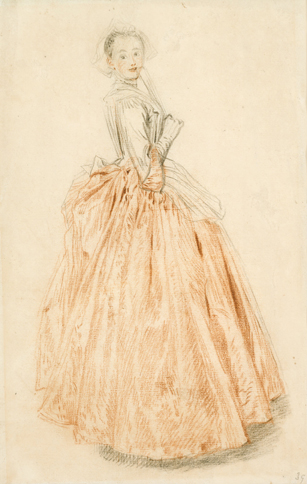
Featured in Drawing Room. Antoine Watteau, Standing Woman Holding a Fan, about 1719. Red and black chalk, with graphite, on paper. Lent by Dr. Esmond Bradley Martin.
European and American Art before 1900
In fall 2019 the DAM received a significant gift of 44 works on paper from the private collection of Dr. Esmond Bradley Martin, previously on long-term loan at the Denver Art Museum (DAM). Ranging from drawings in red and black chalk by 18th-century French master Jean Antoine Watteau (1684–1721) to an early sketch of a man with a pipe by Pablo Picasso (1881–1973), this gift includes important examples by such influential 18th- and 19th-century French artists as François Boucher, Paul Gauguin, Pierre-Auguste Renoir, Édouard Manet, Alfred Sisley and Henri de Toulouse-Lautrec, among others.
The artworks included in the gift are of the highest artistic quality and effectively illustrate the range of the medium and its support of paper. From rapidly executed sketches, to signed and detailed artworks, from sensitive studies to whimsical, personalized menus for a lavish feast, these works allow the viewer entry into the artist's creative process. This generous gift also included three rare works on paper by Claude Monet—a caricature in graphite and two early landscapes executed in pastels—all currently on display in Claude Monet: The Truth of Nature.

Claude Monet, The Seine Estuary, 1864-70. Pastel on paper laid on canvas; 9.3125 x 14.25 in. Denver Art Museum: The Esmond Bradley Martin Collection.
The department also received several paintings last year as part of a multi-year gift from the Berger Educational Trust: Portrait of a Lady by Thomas Lawrence, one of England's preeminent portraitists; A Saddled Bay Hunter by George Stubbs, generally regarded as Britain's greatest horse painter; and Angelica Kauffman's allegorical work, Papirius Praetextatus Entreated by His Mother to Disclose the Secrets of the Deliberations of the Roman Senate.
Modern and Contemporary Art
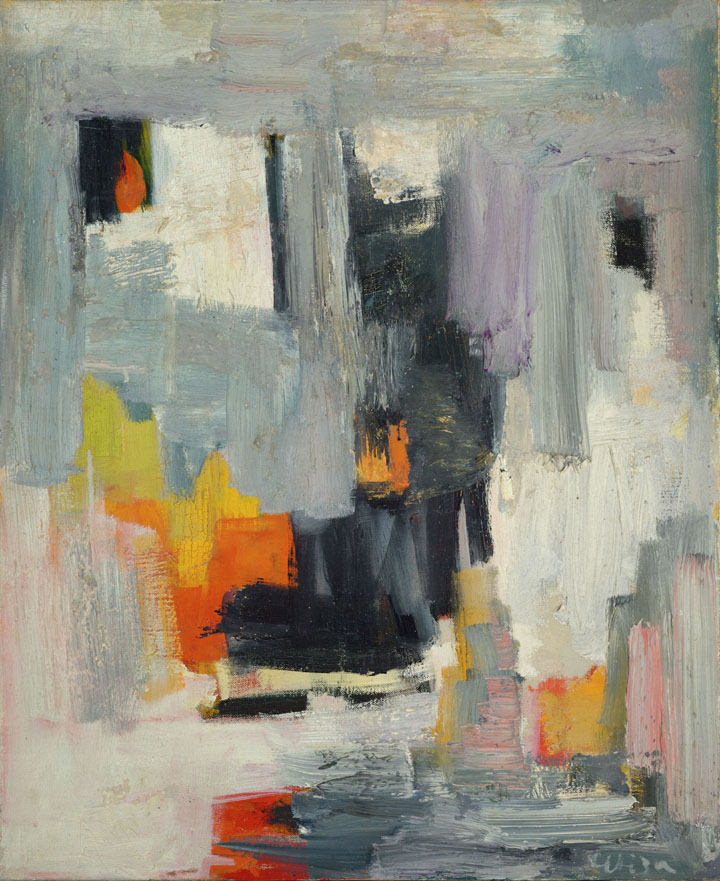
Olga Albizu (Latin American, 1924-2005), Untitled, 1957. Oil on canvas, 22-1/4 x 18-1/4 in. Denver Art Museum: Funds from Burgess Trust and Kimiko and John Powers by exchange, 2018.862. ©Estate of Olga Albizu
In 2019, the modern and contemporary art department welcomed its first acquisition of a work by pioneering Abstract Expressionist artist Olga Albizu, who was active in both Puerto Rico and New York City. Her 1957 painting Untitled demonstrates a key transition in her artistic career in which she shifted away from circular and triangular motions to her mature period characterized by more angular abstraction.

Other works acquired by the department include two paintings by Denver native Jordan Casteel, which were displayed at the DAM in Jordan Casteel: Returning the Gaze—Casteel's first major museum exhibition. Both Fatima (pictured) and Sylvia's (Taniedra, Kendra, Bedelia, Crizette, De'Sean) are strong examples of Casteel's artistic approach that celebrate the black subjects she encounters in her day-to-day life.
Artist John DeAndrea gifted a major work to the DAM, Nude with Black Drape, the third work by the artist to enter the collection, after Linda and Clothed Artist and Model.
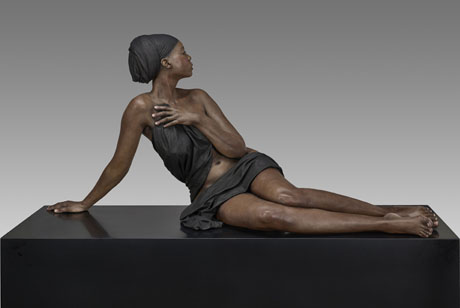
John DeAndrea, Nude with Black Drape, 2014. Oil painted bronze, 50 x 68 x 24 in. © and courtesy of John DeAndrea.
The department also received the gift of a print by Ethiopian-American artist Julie Mehretu.
Another recent purchase was Raqib Shaw's The Sun King Suite, 15 works on paper depicting fantastical creatures and ornamental details. The style and subject matter of his suite demonstrates Shaw's varied art historical influences ranging from European Renaissance art to Persian miniatures to Asian pottery.
Architecture and Design
The department of architecture and design acquired a number of works ranging from contemporary furniture that walks the line between art and design, collections of posters by Steve Frykholm at Herman Miller and the International Union of Students and several designs by noted Italian modernist Gio Ponti that will be on view in an exhibition devoted to Ponti when the newly renovated Martin Building (designed by Ponti) reopens.
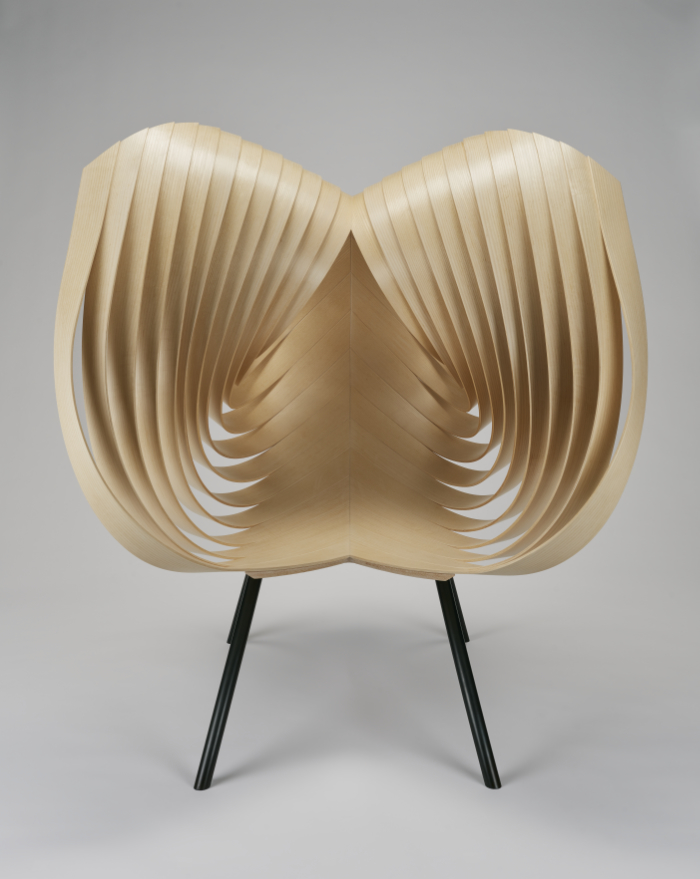
Laura Kishimoto, American, born 1991, Yumi Chair, 2012. Bent white ash and steel. Funds from the Ralph L. and Florence R. Burgess Trust and Gayle and Gary Landis, 2019.530. © Laura Kishimoto.
The Yumi Chair was created by Denver-based Laura Kishimoto, a graduate of the Rhode Island School of Design. Her work is infused by a spirit of exuberance and playfulness, and a sense that the traditional separation between functional object and a work of fine art is arbitrary and obsolete. Kishimoto's series of Yumi chairs, begun in 2012, are unapologetically dramatic and as much an art piece as furniture.

International Union of Students, Keep Space Weapon Free, about 1980. Offset lithograph; 15-1/2 x 11 inches. Denver Art Museum: Acquired by exchange, 2019.387
Founded in Prague in 1946, the International Union of Students (IUS) is a worldwide nonpartisan association of over 150 student groups in 112 different countries. Originally created to defend the rights and interests of students and improve welfare and standards of education, the group became more politically oriented when the Soviet Union invaded Czechoslovakia in 1948 (so much so that they are often considered a Soviet front organization). This group of 141 bold, powerful propagandistic images entering the collection present a broad international collage of causes, events and Congresses that the organization helped arrange or participated in during the 1960s, '70s and '80s.
Native Arts
When Wendy Red Star was an artist in residence at the DAM in 2016 and 2017, the Native Arts department provided her with scans of catalog cards documenting works in the Crow collection. On the backs of many of the cards are beautiful drawings and paintings done by artists during the Works Progress Administration era (1935–43). Using the cards as reference during the Crow Nation's annual Crow Fair in Montana, Red Star took photographs of the people and horses wearing similar material during the parades. Her resulting Accession Series, which provides commentary and context to the museum's existing Crow collection, was fittingly purchased with The Nancy Blomberg Acquisitions Fund for Native American Art, created in memory of our late chief curator and inaugural Andrew W. Mellon Curator of Native Arts Nancy Blomberg.
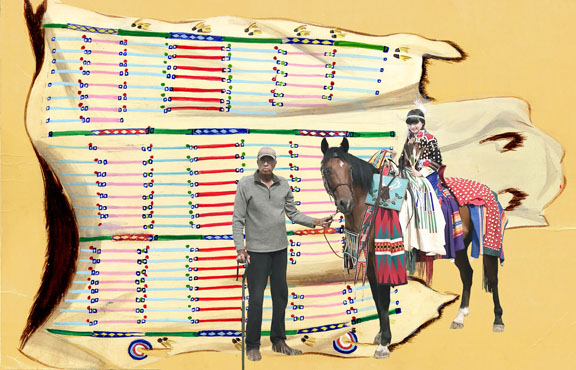
Wendy Red Star (Crow), Catalogue Number 1949.73 (from Accession Series), 2019. Pigment print on archival paper; 18 x 20 in. Denver Art Museum: The Nancy Blomberg Acquisitions Fund for Native American Art, 2019.341.14. ©Wendy Red Star, courtesy of the artist and Sargent’s Daughters, New York.
A gift of four modernist Pueblo paintings by Julian Martinez (San Ildefonso), Awa Tsireh (San Ildefonso), Waldo Mootzka (Hopi) and Tonita Peña (San Ildefonso) from Gary Connell also entered the collection this year. Martinez, Tsireh (aka Alfonso Roybal) and Peña were among "The San Ildefonso Self-Taught Group" of early Pueblo artists. Peña was the only woman of that group. Mootzka was a self-taught artist who passed away at the age of 30 and spent his later years working as a silversmith, so very few paintings by him exist. These works add to a strong collection of Pueblo modernist paintings in the DAM's collection that date from the 1910s to the 1940s.
Asian Art
The Asian art department added both historic and contemporary artworks to its collection during the past year.
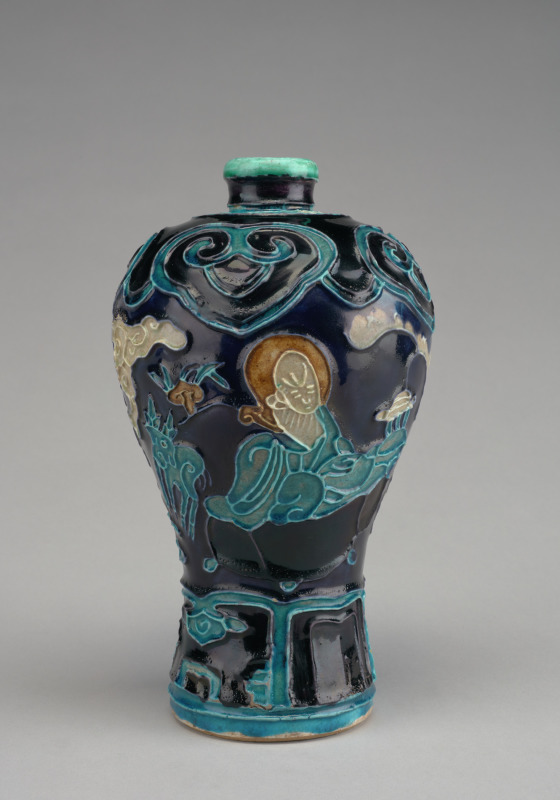
Fahua Ware Jar with Celestial Figures, China, 1400s (Ming dynasty). Glazed porcelain; H: 13 in. x D: 13 in. Gift of the estate of William Kistler Coors, 2019.345
The department received the gift of a Fahua Ware Jar with Celestial Figures from the estate of William Kistler Coors. Made in China during mid-late Ming Dynasty (15th century), Fahua ware ceramics feature cloisonné-like decorations with raised outlines, and blue, yellow (or cream) and green colors on a background of purple glaze. While the earliest examples were made for utilitarian purposes, later porcelain examples from Jingdezhen were made for Buddhist and Taoist temples.
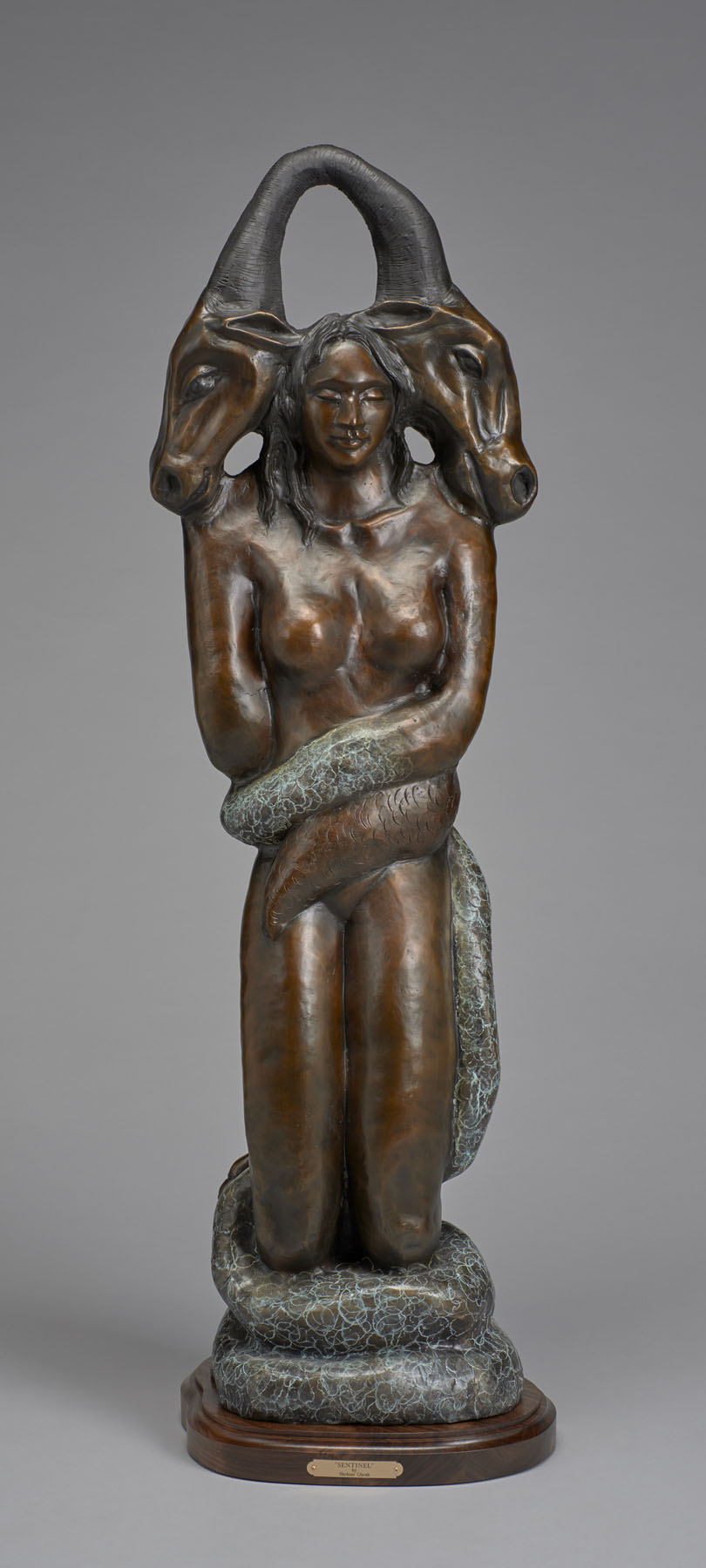
Shohini Ghosh, Sentinel, India, 1999. Bronze; H: 96 x W: 23-1/2 in. Denver Art Museum: Museum purchase, 2019.93. ©Shohini Ghosh
Born in India, artist Shohini Ghosh now lives and works in Colorado. She says her sculpture, Sentinel, which is composed of human, dragon and bovine elements, represents the personification of divine feminine creative power in balance with nature. The acquisition of this piece is one example of the Asian art department's commitment to display works showing the continuity of historical ideas and techniques in contemporary art.
The department also purchased Leang Seckon's 2018 large-scale painting, Prophecy. The Cambodian-born artist's work depicts archetypical historical world leaders, and shows their continuity with modern global leaders who gathered to sign the 1991 Paris Peace Agreements, formally ending decades of war in Cambodia.
Photography
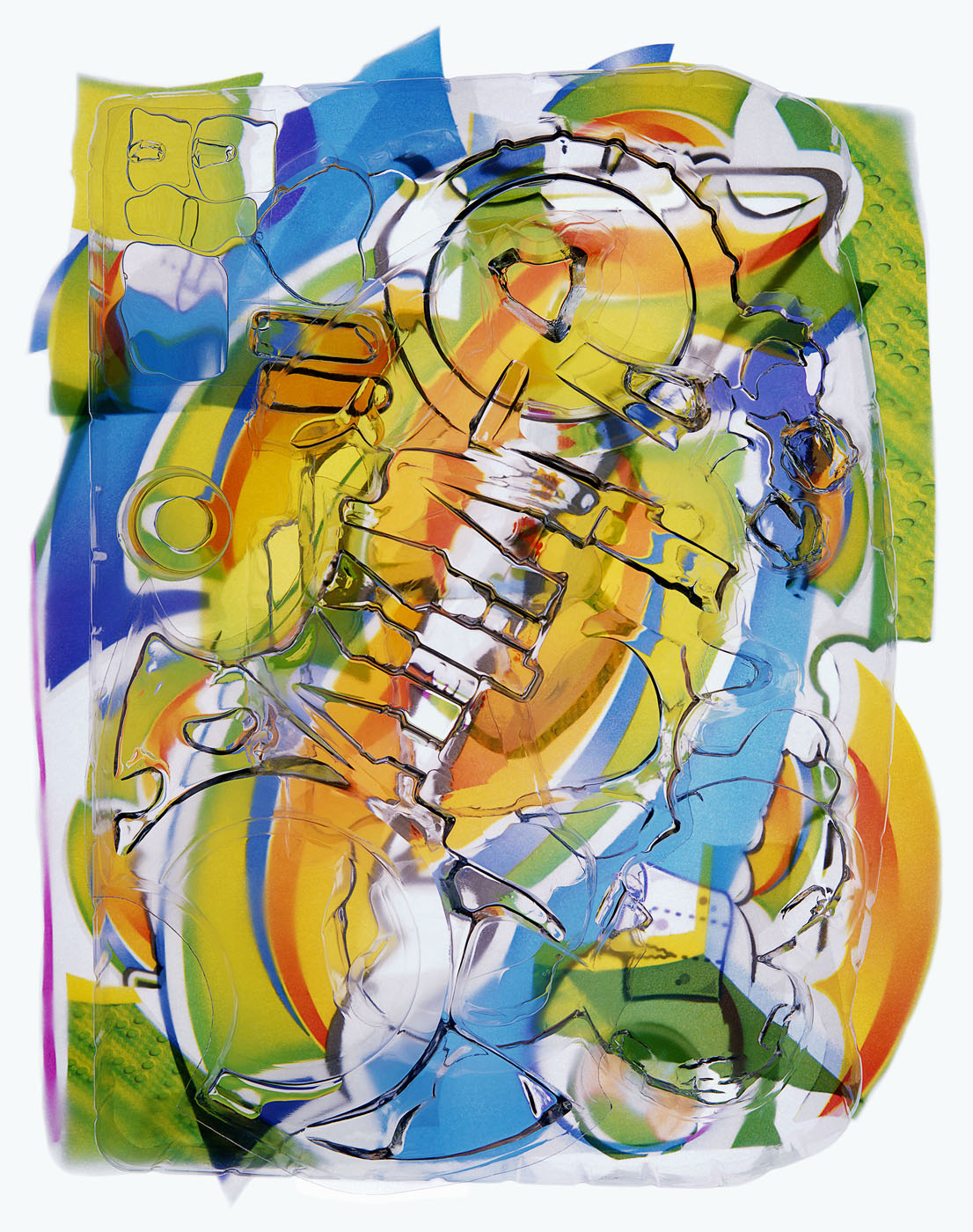
Gary Emrich, All Consumed #2, 2017. Denver Art Museum: Pigment print. Gift of the artist and Robischon Gallery, Denver, 2019.31. Courtesy the artist and Robischon Gallery, Denver.
The photography department acquired several works for its collection, including Gary Emrich's All Consumed #2. The Denver-based artist creates collages from bottled water packaging, plastic blister packs and splashes of water, then photographs them. Emrich's juxtaposition of marketing images of nature's purity with plastic waste products calls out the hypocrisy of consumer culture. Part of the All Consumed series by Emrich, this piece was a gift of the artist and Robischon Gallery in Denver.
In Mary Ann Lea (Dorr)'s 1954 gelatin silver print, Lake Bluff, the photographer experiments with focus to give us a lush and surprising look at a suburban landscape in the fall. The work was acquired with funds from the Photography Acquisition Alliance.
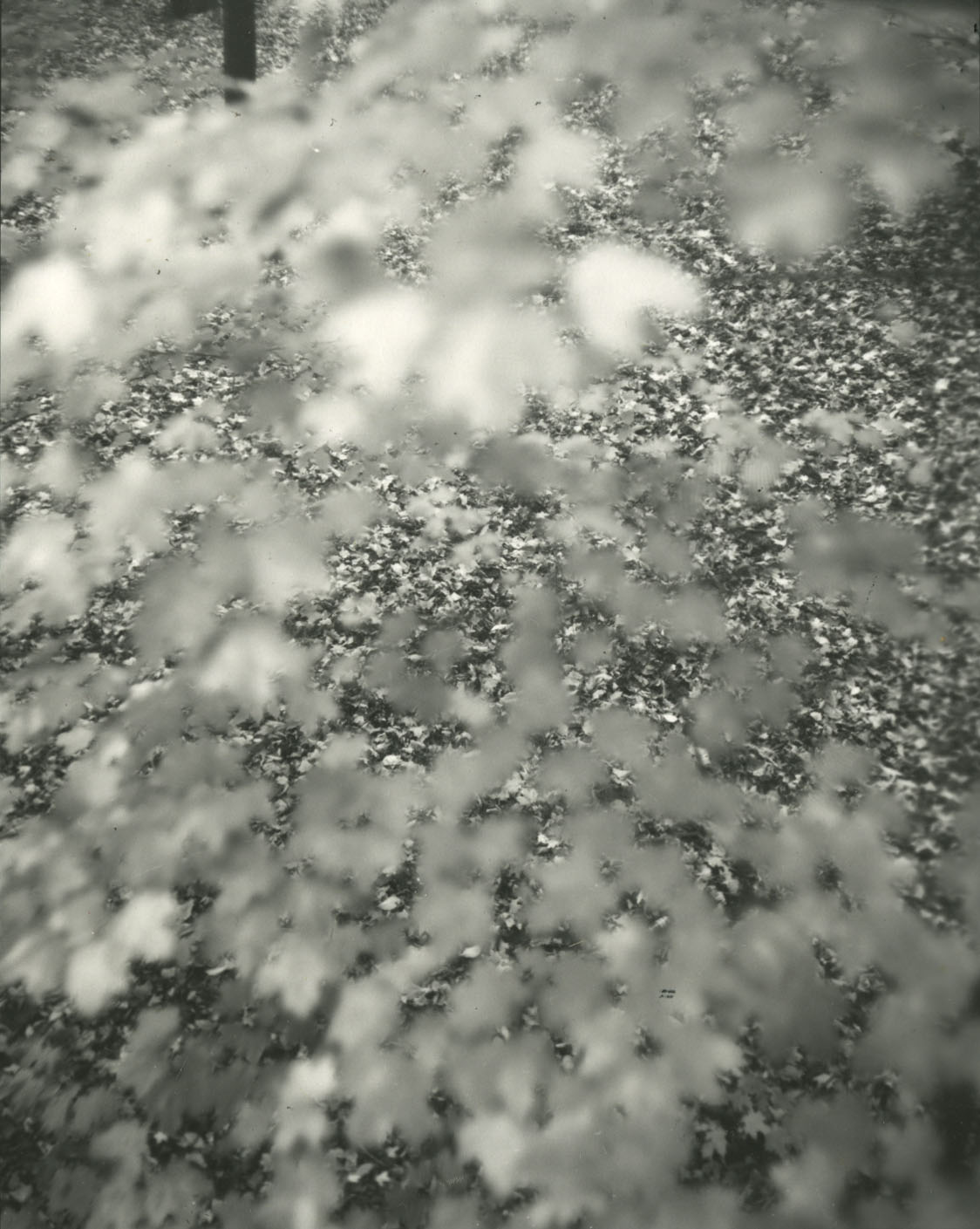
Mary Ann Lea (Dorr), Lake Bluff, 1954. Gelatin silver print; 4-5/8 x 3-3/4 inches. Denver Art Museum: Funds from Photography Acquisition Alliance, 2019.35. ©Estate of Mary Ann Lea (Dorr)
Other works entering the photography collection include Manuel Alvarez Bravo's El ensueño (The Daydream)—a gentle portrait of an adolescent girl by one of Mexico's most renowned 20th century photographers also acquired with funds from the Photography Acquisition Alliance—and Lois Conner's 1992 Bluff, Utah (Medicine Men after Peyote Ceremony), gifted to the museum by the artist in honor of the Diné (Navajo).
Western American Art

James Earle Fraser (American, 1876–1953), The End of the Trail, modeled in 1894, cast about 1919. Bronze; 33-1/2 x 26 x 8-3/4 in. (85.09 x 66.04 x 22.225 cm.). Gift of Henry Roath, 2019.22.
The Petrie Institute of Western American Art acquired several significant historic works as well as more contemporary pieces. James Earle Fraser's The End of the Trail, one of the most iconic images of the American west, was gifted to the museum by Henry Roath. After modeling the sculpture in plaster in 1894, Fraser presented it in monumental scale in 1915 at the Panama Pacific International Exposition in San Francisco, where it won a gold medal. Due to its popularity, Fraser began casting statuettes at Roman Bronze Works foundry in New York.

Thomas Hill (American, born England, 1829–1908), Yosemite, 1865. Oil paint on canvas. Funds from Henry Roath, 2019.539
British-born Thomas Hill moved to California in 1861 and set up a studio in the Yosemite Valley. Acquired with funds from Henry Roath, this large Hudson-River-School-style painting is among the earliest of Hill's depictions of the region. It was created in 1865, a year after President Lincoln signed the Yosemite Grant into law, which set aside Yosemite and Mariposa Grove to the state of California for public recreation and enjoyment.
E. Irving Couse, a founding member of the Taos Society of Artists, is best known for interior scenes of poetic Indian subjects dramatically lit by firelight, as seen in Husking Corn. The use of local props, the attention to human anatomy and grace of form, and the lack of markers of the modern world are all hallmarks of Couse's academic practice. This painting, a gift from George and Hilda Nancarrow, came to the museum in the original artist-designed frame.

E. Irving Couse (American, 1866–1936), Husking Corn, 1932. Oil on board; 12.5 x 16.5 in. (31.75 x 41.91 cm.) Gift of George and Hilda Nancarrow, 2019.106.
The Petrie Institute also acquired three watercolors from 1943 by the Japanese-American artist Kakunen Tsuruoka, produced when he and his family were forcibly removed to the Colorado River Center, a World War II internment camp in Arizona. Tsuruoka beautifully translates the desert of the American West through the misty layered perspective of Japanese painting and the delicate feathering of the tarashikomi technique, revealing the diversity of artistic styles present in the American West. These watercolors emphasize the stories of immigrant and minority artists, and help tell the difficult but important story of Japanese American internment during World War II.
Finally, the Institute also acquired a ceramic jar featuring the powerful graphic of a prickly pear cactus on the curves of an elegant ceramic jar from the 1920s. Created by Julie Mattson, one of the most sought-after artists associated with University of North Dakota art pottery, this piece helps demonstrate the wide variety of art objects created in the western American states during the early 20th century.
Textile Art and Fashion
The department of textile art and fashion received a number of gifts in 2019 including a 1960s Rockmount Ranch Wear Cotton Shirt and 1970s wool suit by Pierre Cardin from J. Michael Thornton, and a Giorgio Armani wool suit from the 1980s from Paul Ramsey. An Issey Miyake shirt and Yohji Yamamoto dress (both from the 1990s) gifted by Susan B. Damour were on view at the DAM in 2016-2017 as part of Shock Wave: Japanese Fashion Design, 1980s-90s.
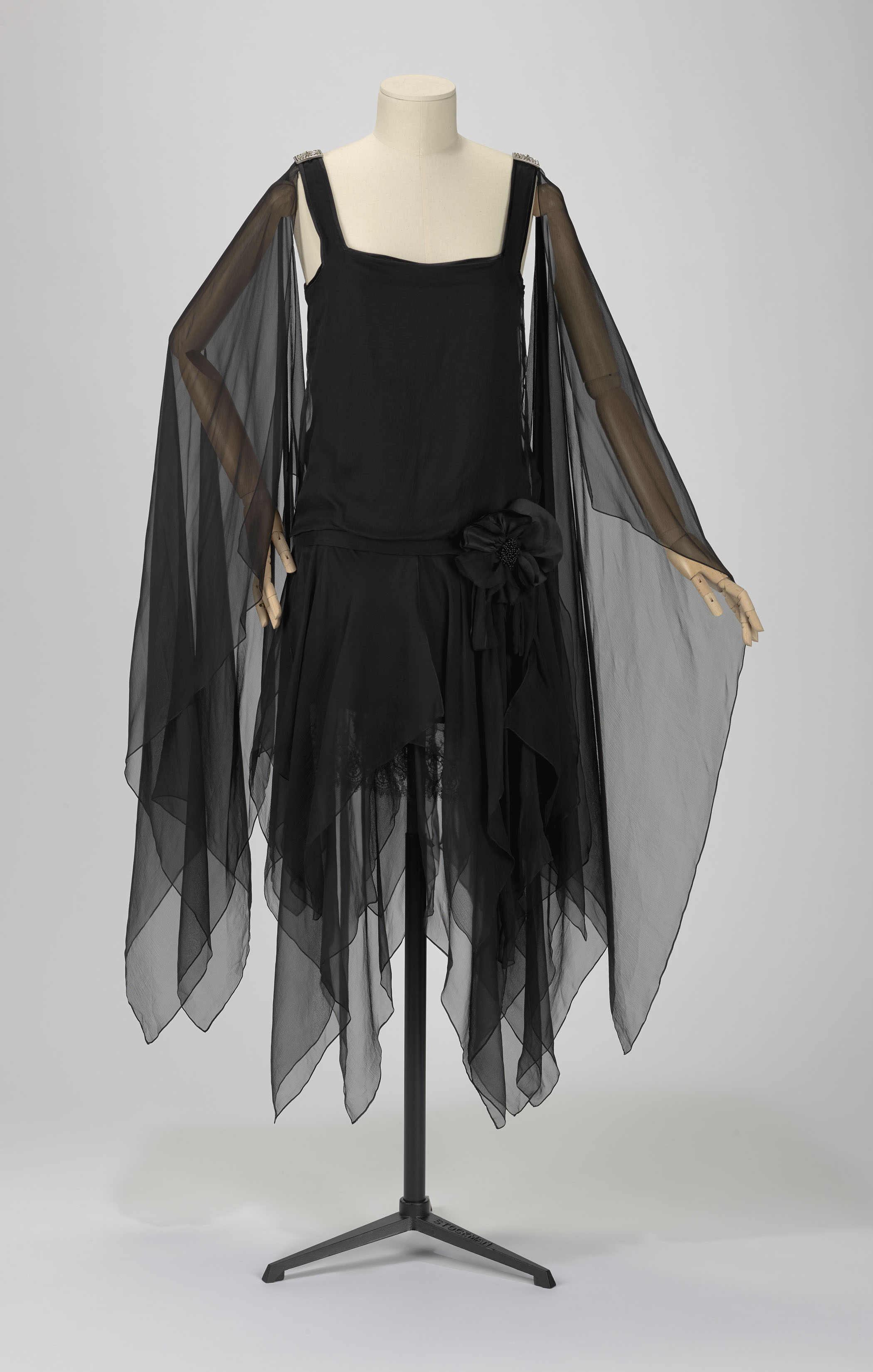
Yves Saint Laurent (Algerian-born, French, 1936-2008). Black Silk Chiffon Dress, Haute Couture Spring-Summer 1982 (worn by Catherine Deneuve). Denver Art Museum: Purchased with funds from AFLC and the Hendrie Endowment, 2019.30.
One significant acquisition was a black silk chiffon dress from Yves Saint Laurent's Haute Couture Spring-Summer 1982 collection. Famously worn by actress Catherine Deneuve, the look was purchased with funds from the Textile & Fashion Circle and the Hendrie Endowment.
Latin American Art
During the past year, the department of Latin American art added works stretching from the 1700s to the 1950s.
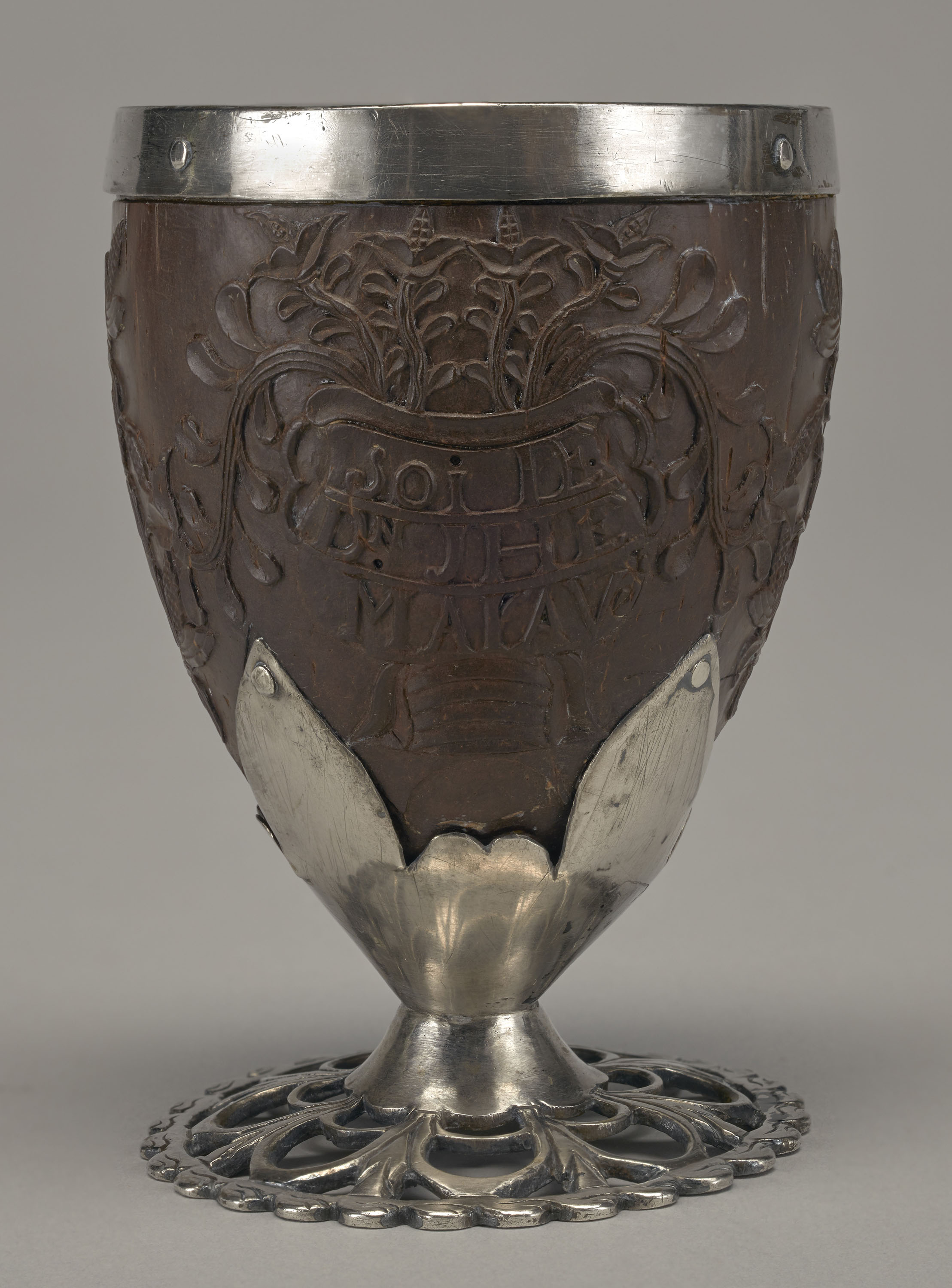
Unknown Artist, Silver Mounted Coconut Jícara (cup), inscribed "SOI DE Dn J H E MARAVer" (I belong to Don J H E Maraver), Guatemala, mid 1750s. Carved coconut shell embedded with silver; 3-5/8 in. Denver Art Museum: Funds from Ethel Sayre Berger by exchange, 2019.553.
By the mid-1500s, European settlers in Mexico started to incorporate native foods into their diet—among them a bitter foamy beverage called xocoatl favored by the native noble classes. Europeans mixed the drink with honey or cane sugar and it rapidly became fashionable throughout the Spanish empire. A small cup named jícara (from the Nahuatl xicalli), carved from a coconut shell or a calabash, was often used to drink chocolate. These jícaras became extremely popular in Spanish America—partly because it was believed that drinking from a coconut was beneficial to one's health.
Likely made in Guatemala, this mid-1700s jícara is mounted in silver and decorated with finely carved designs featuring a coconut tree flanked by rampant lions and cocoa trees with birds. On the opposite side, a cartouche in the shape of a plant urn bears the inscription "SOI DE Dn J H E MARAVer" (I belong to Don J H E Maraver). The first of its kind to enter the collection, it complements a similar piece, the Calabash Cup (1992.406A-B).
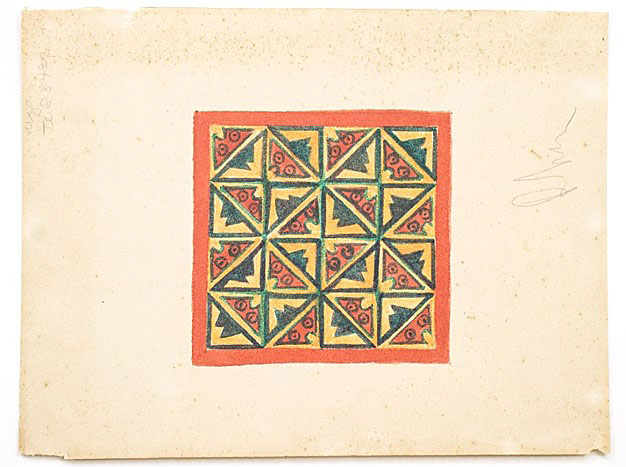
Reynaldo Luza, original fabric design/tiles (one of three), 1950s, Lima, Peru. Gouache, watercolor; 11 x 10 in. Denver Art Museum: Purchased with funds from Frederick and Jan Mayer, 2019.86. ©Estate of Reynaldo Luza
Born in Lima, Peru, in 1893, Reynaldo Luza y Argaluza began his career as an illustrator for local magazines such as Lulú, Cultura, Rigoletto and Monos y Monadas before moving to the United States where he worked for magazines such as Vogue and Vanity Fair. Hired to work for the New York City office of Harper's Bazaar in 1921 as chief fashion illustrator, Luza relocated to Paris where he worked closely with important fashion designers including Chanel, Schiaparelli and Balenciaga, among others.
When Luza moved back to New York City in 1940, he also began producing fabric and furniture design, introducing what he called "The Colors of the Andes"—a chromatic palette that reflected the nature and colors of South America. Returning to Peru in 1950, Luza focused on interior and fabric design, becoming the country's preeminent interior designer of the 1950s and '60s, utilizing motifs he found in ancient Peruvian textiles and interpreting them in his "Colors of the Andes." The three fabric designs purchased for the collection (birds, red and tiles—shown above) showcase mid-20th century historic revivalism in modern Latin America.
Art of the Ancient Americas
Art of the ancient Americas continues to be a touchstone for contemporary Latinx artists who research past practices and motifs and incorporate them into their own explorations of identity and contemporary practice. While the DAM's art of the ancient Americas collection primarily focuses on objects produced during the 4,000 years of civilization prior to Spanish arrival, its expanded scope will include works by contemporary artists who deliberately invoke the past to investigate and question the present, and one significant acquisition in 2019 exemplifies that goal.
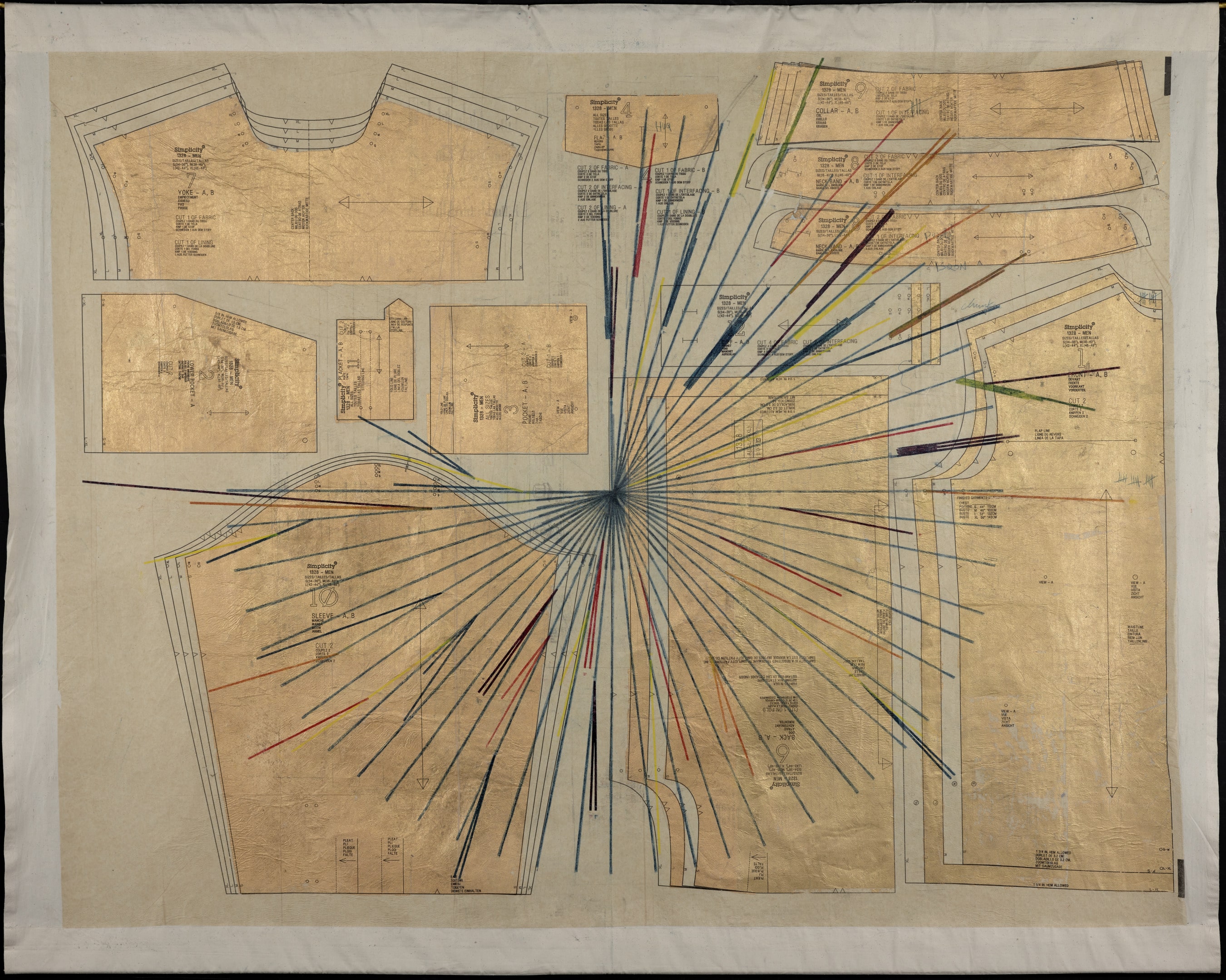
Ronny Quevedo (b. 1981, Guayaquil, Ecuador), los desaparecidos (the arbiter of time), 2018. Wax, pattern paper and gold leaf on muslin; 50 x 62 in. Denver Art Museum; Purchased with generous funds from the Marion G. Hendrie Fund, Ralph L. & Florence R. Burgess Trust and Alianza de las Artes Americanas in honor of Ruth Tomlingson. ©Ronny Quevedo
Using abstracted images of athletic fields, stadiums and/or Inka khipus, artist Ronny Quevedo weaves together his own family's history of migration, displacement and adaptation within the larger narrative of conquest, colonization and creation. His artwork, los desaparecidos (the arbiter of time) incorporates materials referencing the professions of his parents—muslin used for garment patterns in a nod to his seamstress mother and concentric lines reminiscent of a clockface mark a 45-minute segment, the same as a soccer period. His father—a professional soccer player in Ecuador—served as a referee in the United States.
The imagery also points to the past heritage of Ecuador, his homeland. The pattern pieces evoke the bodies of the disappeared, the desaparecidos mentioned in the title, a reference to the brutal practices of Latin American dictators who arrested and imprisoned individuals who often were never seen again.
Quevedo includes numbers written in the Quechua language along several of the strings. As well as marking the passage of time, the lines suggest the Inka khipu, a mnemonic device made up of knotted cords used throughout the Inka empire to track the movement of goods and people. While the khipu evokes the land of his father, Quevedo's khipu also alludes to the movement of his family from Ecuador to the Bronx.
